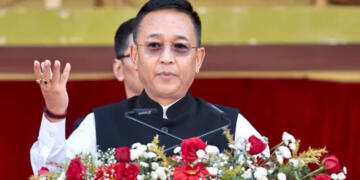A division bench of Justice Ali Mohammad Magrey and Justice Sanjay Dhar of Jammu & Kashmir High Court last Wednesday (November 3) granted four weeks’ time to the government to respond to a PIL seeking the introduction of Islamic Banking in Jammu and Kashmir.
The PIL filed by an NGO named ‘J&K Peoples Forum’ in 2018 attempts to establish a Sharia-compliant, that is, Islamic banking window in banks across the UT. However, the Reserve Bank of India (RBI) has already cast aspersions over the feasibility of the idea, and shot it down.
RBI rejected the notion:
The RBI in 2017 had decided not to pursue a proposal for the introduction of Islamic banking in the country. Replying to an RTI query, the central bank said that the decision was taken after considering “the wider and equal opportunities” available to all citizens to access banking and financial services.
Former RBI governor, D Subbarao had also remarked, “Islamic banking is not possible. There are some legal problems. We have studied the issue. We appreciate the objectives behind the request. But there are some legal problems. It can be got around not through banking, but other vehicles.”
What is Islamic banking?
Islamic banking is a banking system in accordance with the Sharia. In Islam, money has no intrinsic value – money, therefore, cannot be sold at a profit and is permitted to be used as per Sharia only. Meaning, there is no concept of charging interest in Islamic banking. Even if there is, the profits are minimized.
It is not clear how they came to the conclusion that ‘interest-free banking’ is the way to go about in banking, but perhaps, it was to not allow big bankers or lenders to fleece the commoners.
However, those were archaic times and banks have evolved now. There is a system of checks and balances, and if Islamic banks cannot invest in bonds, T-bills, commercial paper, or lend to finance inventory or projects for interest – it defeats the entire purpose of banking.
In general, Islamic banking institutions tend to be more risk-averse in their investment practices. As a result, they typically avoid business that could be associated with economic bubbles. The banks are supposed to be a safe space where even the poorest strata can go and avail loans.
Conventional banks are still averse to giving loans to a layman, but they are at least open to the idea. However, with Islamic banks only making a profit, if and when the business makes profit, it becomes all the more difficult for them to give out the loans.
Turkey – a case of Islamic beliefs taking down a country’s fortune:
Turkish Islamic banks’ market share rose to 7.2% of total banking sector assets at the end of 2020. However, since then, not entirely due to Islamic banks, but the economy of the Muslim country has been on a downward spiral.
President Recep Tayyip Erdoğan’s lackluster fiscal policies are killing what was once a booming economy. Erdoğan opposes any move to hike interest rates, even as Turkey faces very high inflation rates and a constantly depreciating currency, Lira.
It is well-settled amongst economists, that interest rates must be raised to restrict inflation. But Erdoğan believes that higher interest rates further push inflation. However, sources privy to the matter believe that Erdogan is chained by the beliefs of Sharia, where increasing interest rates is a frowned upon practice.
The Turkish President keeps cutting interest rates at regular intervals and cracks down on rational economists in his government who advocate increasing interest rates.
The recent inclusion in the FATF (Financial Action Task Force) grey list is further expected to squeeze its economy and make the lives of ordinary citizens difficult. Global investors are maintaining a safe distance from Turkey already. Total foreign investments in Turkish stocks and bonds stood at just $30.6 billion at the start of August. FDI too went down to $5.7 billion last year, as against the record $19 billion in 2017.
Also read: India paints Turkey FATF Grey before Diwali
Why the demand of Islamic banks?
The NGO group has been pursuing its demands based on an idea mooted by Raghuram Rajan in his report on the Financial Sector in the year 2008. He had called for interest-free banking techniques to be operated on a larger scale, so as to give access to those who are unable to access banking services, including those belonging to economically disadvantaged section of the society.
However, since then, much water has flowed under the bridge. Banking is no longer inaccessible to the masses. Reported extensively by TFI, the introduction of Pradhan Mantri Jan Dhan Yojana (PMJDY) has brought the rural and downtrodden population in touch with the banking sector.
According to a recent report, the number of bank branches per 100,000 adults in India rose to 14.7 in 2020 from 13.6 in 2015, due to PMJDY. Moreover, mobile and internet banking transactions per 1,000 adults have increased to 13,615 in 2019 from 183 in 2015.
Also read: Riding high on the wave of Jan Dhan Yojna, India beats China in financial inclusion
Succinctly put, Islamic banking is a bad idea, right from the word go. It is an instrument intended to fool Muslims. Only a government trying to woo a sectarian vote would even think of legislating such a law, especially in a country like India, where the constitution has given us a secular credential.


























